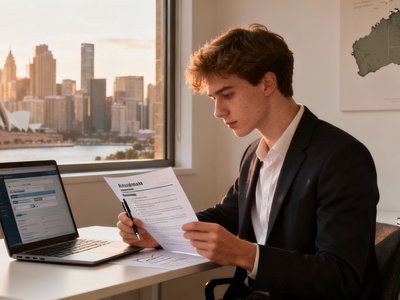
How to Get a Job in Australia Right Now
Feeling lost in the Australian job market? This guide has real, practical steps on how to get a job, from fixing your resume to nailing the interview.
31 Oct 2025
Feeling nervous about what to take to a job interview? Here's a practical checklist of 10 essentials to bring that show you're prepared and professional.
Blog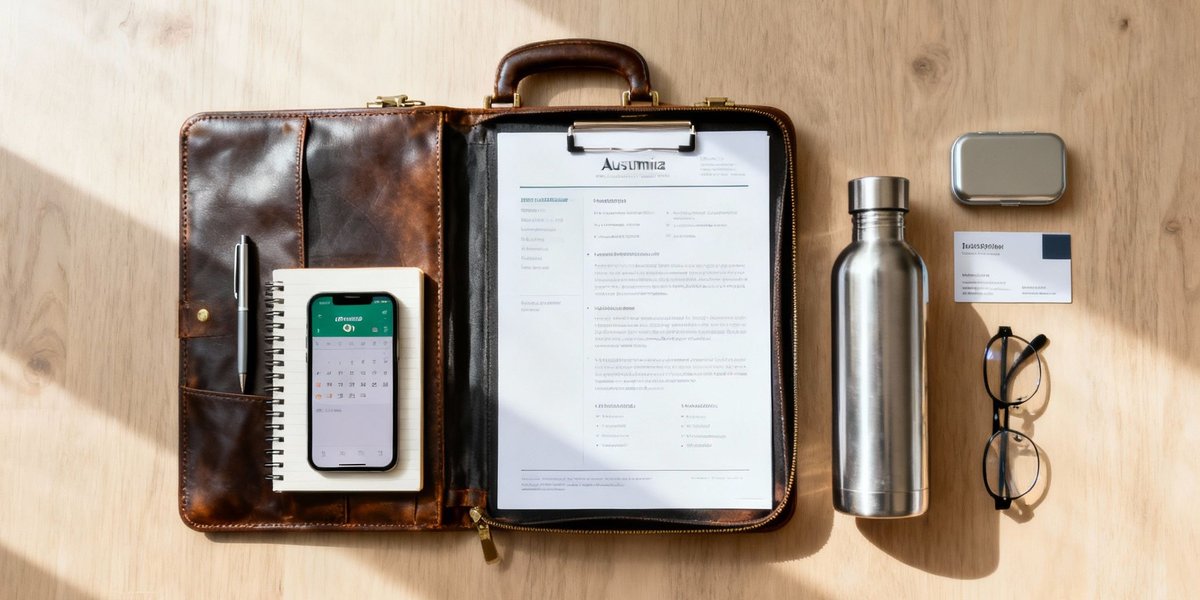
So, you've got the interview. First off, congrats! That's a huge win. But now comes that other feeling, right? That little flutter in your stomach. It’s a messy cocktail of excitement and pure, unadulterated nerves. You've polished your resume until it shines, practised your answers so much you could recite them in your sleep, and you've picked out an outfit that confidently says, "I'm a professional who definitely has my life together."
And then it hits you. A tiny, nagging thought that creeps in out of nowhere... wait, what do I actually need to bring?
We've all been there. I've definitely been there. Standing by the front door, bag in hand, having a last minute panic attack that I’ve forgotten something ridiculously important. It’s a bit like that dream where you show up to an exam without a pen, except this feels way more important. This guide is all about quieting that panicked voice for good. It isn't just a boring checklist. It’s about walking into that room feeling calm, confident, and like you're completely in control. Think of this as your pre-game ritual, a way to build a secret weapon that’s disguised as a bag. Because confidence isn’t just about the clothes you wear... it's knowing you've got all your bases covered before you even step onto the field.
Okay, I know what you're thinking. "But they already have my resume, I emailed it to them!" And you're not wrong. But bringing a physical copy? That's a power move. It really is. Picture this... your interviewer is rushing from another meeting and didn't have time to print yours out. Or maybe, plot twist, a second interviewer joins the conversation out of the blue. Handing them each a crisp, clean copy of your resume instantly shows you're prepared, professional, and organised. It’s such a small thing, but it makes a massive impact.
This isn’t just a piece of paper, after all. It’s your professional story, boiled down and tailored specifically for this role. It acts as a handy reference point for both you and the interviewer, a way to guide the conversation back to your biggest wins. Getting this document right is a massive step in the whole job search journey. If you need more help getting it perfect and navigating the whole hiring circus, you can find a heap of info in our complete guide on how to get a job.
If your resume tells them your story, your portfolio shows it. This is huge. For so many roles, especially in creative, tech, or marketing fields, bringing actual proof of your skills is a total game-changer. It’s one thing to say you "increased user engagement." It’s another thing entirely to pull out a case study, a design, or the actual campaign that did it. This shifts the conversation from "what could you do?" to "look what I've already done." You're not just a candidate anymore. You're a proven problem-solver.
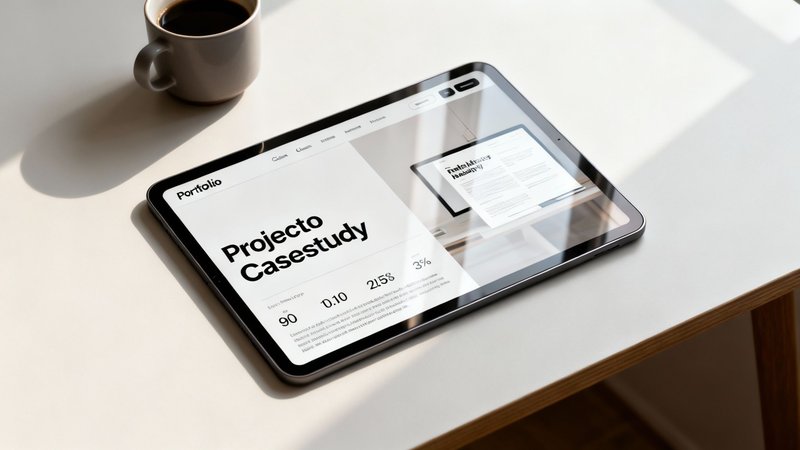
Your portfolio is basically your highlight reel, carefully curated to match what this specific company needs. It lets you take the reins of the interview for a moment, drawing their attention to your proudest achievements and showing them how you think. It's a powerful way to tell a visual story and can really set you apart from the pack. For anyone wanting to make an even bigger splash, a dynamic video portfolio can be an incredibly memorable way to show off your work and your personality at the same time.
In a world of LinkedIn requests and QR codes, a business card can feel a bit... old school, can't it? But trust me, handing over a physical card is a subtle yet powerful move. It’s a tangible reminder of who you are, long after you've walked out of the room. Think of it as leaving a professional breadcrumb trail that leads right back to you. It shows you're thinking ahead and you understand professional etiquette, making you memorable in a sea of digital applications. It’s a classic touch that just says you’re serious about your career.
This little piece of card does more than just share your contact info; it reinforces your personal brand. It's a conversation starter and a final, polished touchpoint at the end of your meeting. Whether you're a freelancer, a seasoned pro, or currently between jobs, having a personal business card shows you’ve invested in yourself. For professionals aiming high, understanding these little details is so important. You can explore more strategies for getting ahead in our deep-dive article on how to become a CMO.
Walking into an interview and pulling out a notepad and pen sends a powerful, unspoken message. It says, "I'm here to listen, I'm engaged, and I value what you have to say." It’s so much more than just a way to write things down. It visually shows that you’re prepared and genuinely interested. You’re not just a passive participant waiting for your turn to talk; you’re an active, thoughtful candidate ready to absorb the details. This simple act can instantly make you stand out.
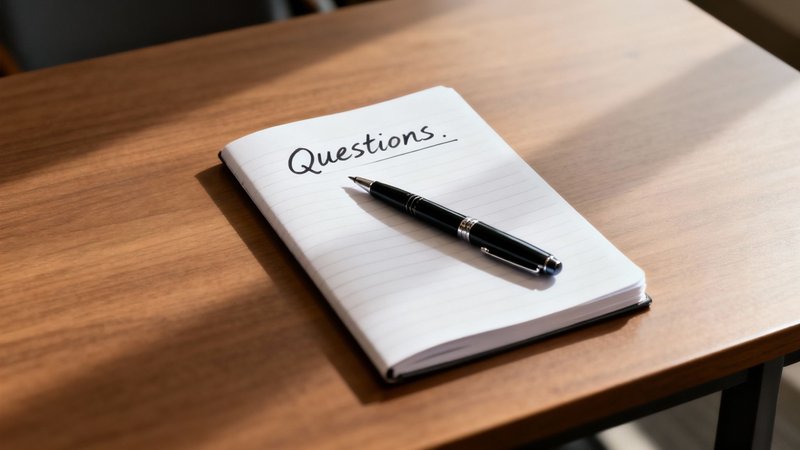
Now, this isn't about writing down every single word they say. Not at all. It’s a strategic way to capture key information, like the interviewer's name, specific details about a project, or even questions that pop into your head while they're talking. Having these notes is gold later, especially when you sit down to write your thank-you email. A professional, slim notebook (something like a Moleskine) and a decent pen are probably the most underrated tools in your interview kit. Such a small thing that speaks volumes.
Walking into an interview armed with just your memory can feel like trying to walk a tightrope without a safety net. That’s where a dedicated preparation notebook comes in. Now, this isn't something you'll bring into the interview room with you. This is your secret weapon for the crucial hour beforehand. It’s one single place to cram all your research: the company's mission, recent news, key products, and even your thoughts on their culture from places like Glassdoor. It’s your whole strategy, all in one spot.
Think of it as a pre-game ritual. I always do this. Sitting in my car or a nearby cafe, I can quickly review my prepared answers, the key stats about my achievements, and the smart questions I plan to ask. This simple act of a final review calms my nerves, centres my focus, and makes sure all my hard work is fresh in my mind. It transforms all those scattered thoughts into organised confidence, which is exactly the vibe you want to project from the second you walk through that door.
Your outfit is the very first thing an interviewer sees. It speaks volumes before you even say a single word. This isn’t about having the most expensive suit; it’s about showing respect. Respect for the opportunity, for the company, and for yourself. Dressing appropriately proves you’ve done your homework and you understand the company’s culture. It’s a silent, powerful signal that you’re a professional who takes this whole process seriously. It’s less about fashion and more about fit... both for your body and for their team.
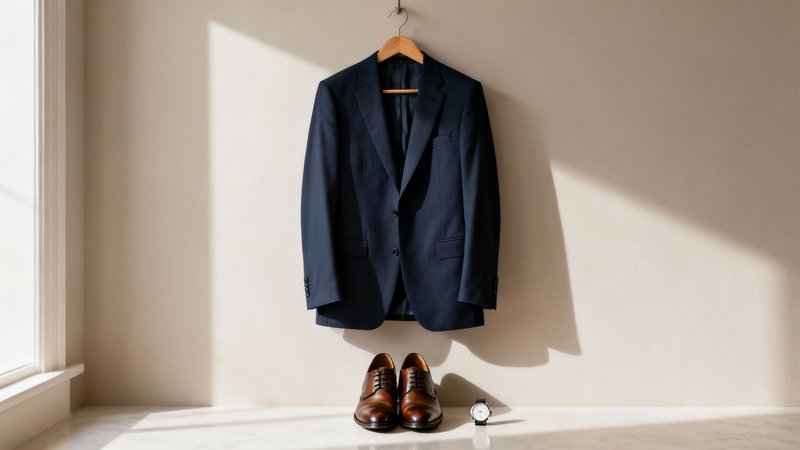
This is a huge part of your personal brand, a visual snapshot of who you are as a professional. And it's not just about picking the right clothes, it's about looking after them too. You can find helpful business laundry care tips for busy professionals to make sure your gear is always ready to go. Nailing your professional appearance is a crucial step, and you can learn more about positioning your personal brand to land those high-value roles.
I know, I know. This one might seem a bit premature, but hear me out. While you probably won't need it during the first interview, sometimes things move unexpectedly fast. An on-the-spot job offer could lead straight to filling out initial HR paperwork. Having your government-issued ID and Social Security card ready to go shows you’re not just prepared for the conversation... you’re prepared for success. It’s a quiet signal that you’re organised, serious, and ready to get started.
These documents are the first step in the official hiring process, often needed for background checks and all that fun stuff. Having them on hand can speed up the whole thing, leaving a lasting impression of efficiency. Think of it as the final piece of your professional puzzle, just waiting to be put in place when the offer lands. For more guidance on acing every stage of the job hunt, our big overview on how to get a job has you covered.
Your phone is your lifeline. Let's be honest. It got you here, navigating with maps and letting you re-read the job description one last time in the lobby. But the second you step into that building, its role changes completely. Its only job now is to be completely silent and completely invisible. A buzzing, ringing, or vibrating phone during an interview is more than just a distraction. It screams a lack of preparation and a lack of respect for the interviewer's time.
This isn’t about being anti-technology. It's about showing your focus and professionalism. Making sure your phone is silenced proves you’re fully present and dedicated to the conversation you're having. It’s a simple act of courtesy that backs up your image as a considerate and organised candidate. Making sure this is on your checklist of what to take to a job interview is a tiny step that prevents a potentially huge mistake.
Don't laugh at this one. In a world where we all have Google Maps, this might seem like overkill, but trust me, it's not. I've been burned by this. Your phone could die, you could lose reception, or the app might decide to send you on a scenic tour of the city's worst traffic jam. Being late is pretty much the worst way to start an interview, and all that stress is completely avoidable. Having your arrival plan sorted shows you're a planner... someone who thinks ahead and prepares for things to go wrong.
This isn’t just about knowing the address. It’s about making sure you arrive without any stress. It means you can walk in calm, collected, and ready to impress, rather than flustered and apologising for being late. It's a small act of self-care that sets the stage for you to perform at your best. Considering everything else you need to worry about, what to take to a job interview should definitely include a solid travel plan.
Much like your resume, this might feel a little old-fashioned, but having a reference list ready to go is a sign of ultimate preparedness. It shows you’re not just confident in your own skills, but you also have a professional network ready to back you up. When an interviewer asks for references and you can immediately hand over a professionally formatted document, it sends a seriously powerful message. You’re organised, proactive, and you have nothing to hide. It's a small gesture that screams competence.
This document is your final piece of social proof, a curated list of professionals who can talk about your skills, work ethic, and character. Think of it as the encore after your great performance. Having it ready to go removes any awkward fumbling or delays later in the process, keeping your momentum going strong. It’s a key part of what to take to a job interview because it shows you’re always thinking a few steps ahead.
See? It’s not so scary when you break it down into small, manageable steps. Packing your bag is the final, physical ritual in your preparation. It’s that last little bit of organisation before you walk in there and absolutely smash that interview. It's the moment it all starts to feel real.
Ultimately, knowing what to take to a job interview is less about having a perfect collection of items and more about the quiet confidence it gives you. It's about getting rid of that last-minute panic so you can focus on what really matters... your conversation. You’ve done the hard work. You've researched the company, you've rehearsed your answers, and now, you're perfectly organised. This frees up your mental energy to just be present, to listen properly, and to actually connect with the person sitting across from you.
Remember, they aren’t just hiring a CV; they’re hiring a person. All these items… the polished resume, the thoughtful questions in your notebook, the slick portfolio… they're just props. They’re tools to help you show them the best, most authentic, and most prepared version of yourself. Your preparation is a signal to them that you’re serious, professional, and genuinely excited about the opportunity.
So, zip up that bag. Take one last look in the mirror and give yourself a nod. The person staring back is capable, prepared, and totally ready for what comes next. You've got this. Now go and show them why you're the one they've been waiting for.
Looking for your next senior marketing role or project? Cemoh connects Australia's top marketing professionals with leading businesses, taking the guesswork out of finding your perfect career match. Explore our vetted network of opportunities at Cemoh and land an interview where you can truly shine.
Here are some suggested articles that are closely related to this post

Feeling lost in the Australian job market? This guide has real, practical steps on how to get a job, from fixing your resume to nailing the interview.

Need a marketing consultant for small business? Discover expert tips and guidance to boost your small business marketing success today.

Build a small business marketing strategy that works. This guide offers practical, no-nonsense tips for real results, designed for Australian business owners.
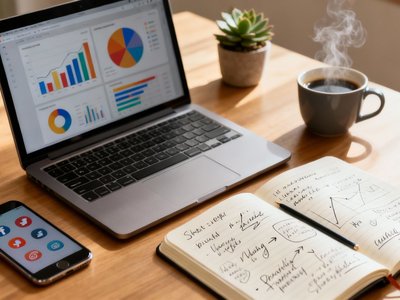
Finally, a practical marketing strategy for small business owners in Australia. No jargon, just real-world advice to help you connect with customers and grow.
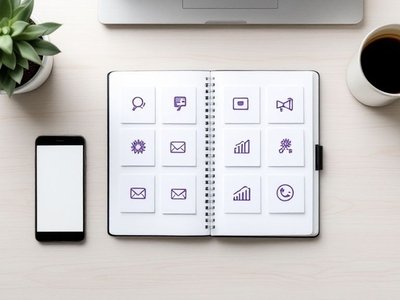
Feeling stuck? Discover practical, low-cost small business marketing ideas you can use today. Real examples for Australian businesses.

Explore how a fractional CMO Australia can elevate your marketing strategy, reduce costs, and drive growth for your business. Find out more now!